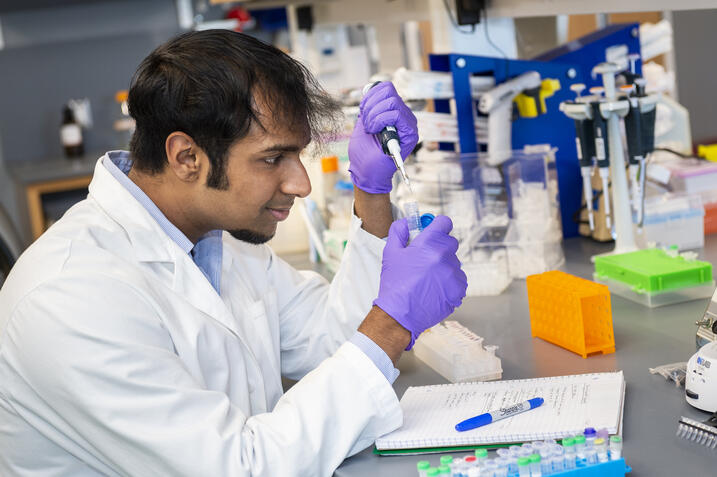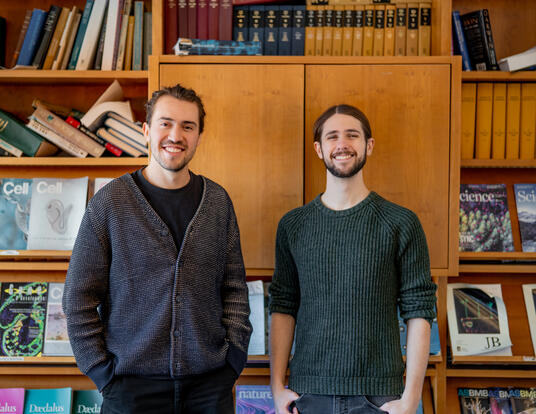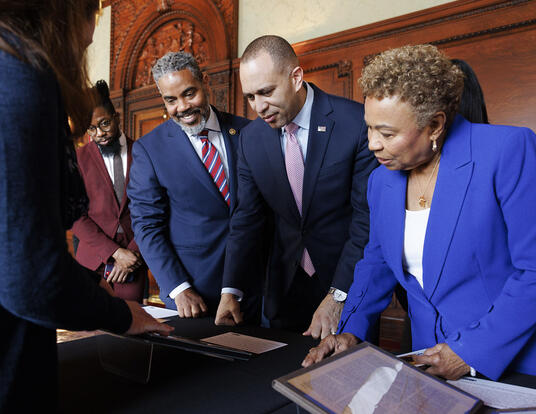Sadagopan Named 2025 Hertz Fellow
PhD student researches new therapies for difficult-to-treat diseases
Research at Risk: Since World War II, universities have worked with the federal government to create an innovation ecosystem that has yielded life-changing progress. Now much of that work may be halted as funding is withdrawn. Find out more about the threats to medical, engineering, and scientific research, as well as how Harvard is fighting to preserve this work—and the University's core values.

The Fannie and John Hertz Foundation announced on May 6 that Harvard Kenneth C. Griffin Graduate School of Arts and Sciences (Harvard Griffin GSAS) PhD student Ananthan Sadagopan has been named one of its 2025 Hertz Fellows. The prestigious fellowship is one of the nation’s most competitive awards for graduate students in applied science, engineering, and mathematics. Sadagopan is one of just 19 recipients selected for the 2025 cohort.
The Hertz Fellowship offers five years of graduate funding and provides exceptional students with the independence to pursue transformative research unconstrained by traditional academic limitations. In addition to financial support, fellows gain lifelong access to a multidisciplinary, global network of over 1,300 alumni who have led groundbreaking scientific and technological achievements over the past six decades.
Sadagopan is pursuing his PhD in biological and biomedical sciences at Harvard, where his research focuses on chemical biology and the development of new therapeutic strategies. This work involves a number of novel approaches in molecular medicine, including targeted epigenetic remodeling with small molecules, modular gene activation, new methods for targeted protein relocalization, ligand design, logic-gated targeted protein degradation, and the intracellular delivery of macromolecules. Sadagopan’s goal is to address diseases that remain difficult to treat with current therapies through the development of innovative chemical tools.
“Receiving the Hertz Fellowship is a tremendous honor that empowers me to push the boundaries of chemical biology and therapeutic development," he says. "I look forward to connecting with a community of innovators whose guidance and collaboration will accelerate my efforts to develop next-generation therapies for currently intractable diseases."
The 2025 class of Hertz Fellows includes individuals working on a diverse array of complex global and national challenges, from developing proprioceptive robotic hands to designing collision avoidance systems for satellites and creating grid-scale renewable energy storage technologies. Fellows conduct their doctoral research at 12 of the nation’s leading institutions. This year marks the first time that fellows have been selected from Memorial Sloan Kettering Cancer Center and Rockefeller University. The foundation also welcomed its 31st fellow to have graduated from the United States Military Academy at West Point, continuing its impressive tradition of supporting young innovators with distinguished military experience.

Founded in 1957, the Hertz Foundation identifies and supports the nation’s most promising innovators in science and technology. The fellowship program is designed to equip emerging leaders with the resources and network necessary to address critical issues in national security, medicine, energy, and emerging technology. In exchange for this support, Hertz Fellows make a moral commitment to contribute their skills to the nation in times of need.
Hertz Fellows also benefit from robust community engagement, including access to longtime mentors, interdisciplinary programming, and connections with influential organizations such as the Gates Foundation, Lawrence Livermore National Laboratory, and other partners across academia, industry, and government. Together, the fellowship network comprises over 1,300 individuals whose innovations and achievements shape multiple sectors.
Throughout its 62-year history, the Hertz Fellowship has supported scholars who have gone on to receive many of the highest honors in science and engineering. Notably, past fellows include Nobel laureates, recipients of the Breakthrough Prize, MacArthur Fellowship “genius” awardees, and founders and leaders of major research institutions and technology companies. The fellowship’s alumni hold more than 3,000 patents and have founded over 375 companies, contributing to scientific advancement, economic growth, and national competitiveness. For more information about the Hertz Foundation and its programs, visit www.hertzfoundation.org.
This article was engineered and edited by Paul Massari. Draft copy generated by GPT 4.0 from materials provided by the Hertz Foundation.
Ananthan Sadagopan's research was funded in part by a grant from the National Institutes of Health.
Get the Latest Updates
Join Our Newsletter
Subscribe to Colloquy Podcast
Simplecast




